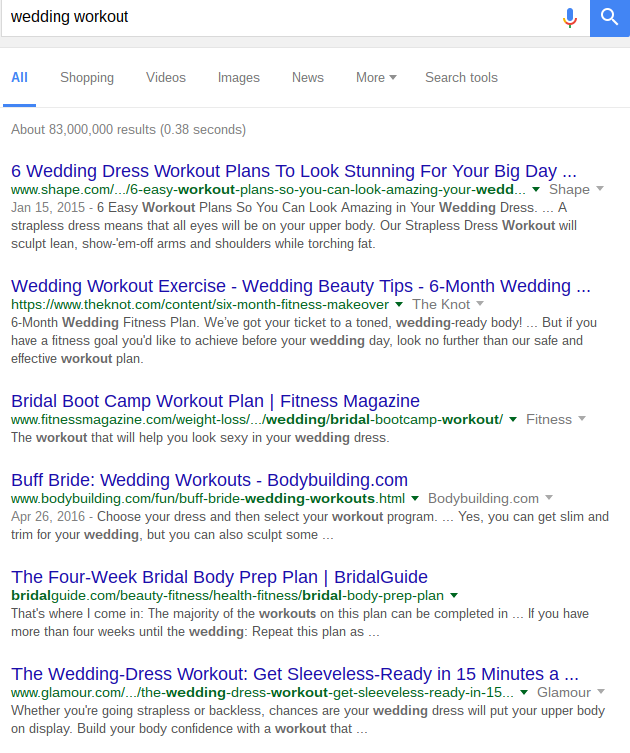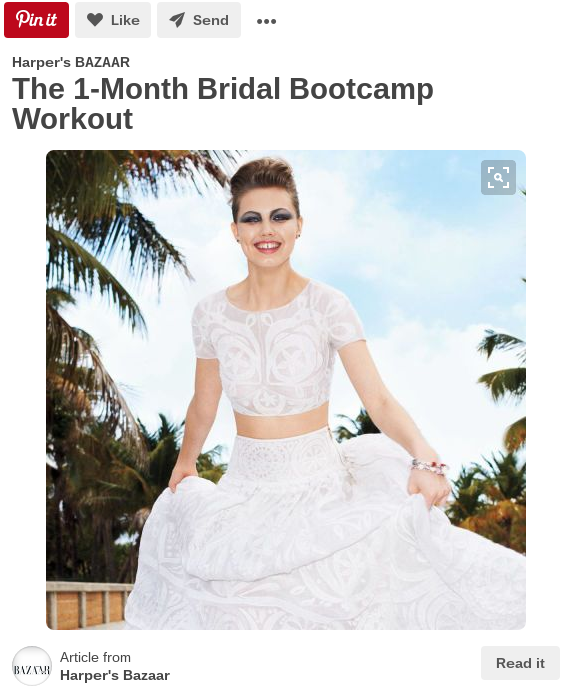The Mental Health Crisis That Hits During Wedding Season

By:
In theory, shopping for a dress is supposed to be one of the more enjoyable aspects of planning your wedding. However, there's a hidden danger in what is portrayed as a joyous step in preparing for the big day. The popular TLC series, "Say Yes to the Dress" paints wedding dress shopping as a rare opportunity for women to feel like pampered princesses. (Champagne, pedestals, opulent gowns.)
For me, however, going wedding dress shopping was not a dazzling experience. It was a troubling reminder of my body image issues, weight obsession, and past eating disorder tendencies.
During a study abroad program in France the summer before my senior year I put on close to 20 pounds. All I'd ever known was life as a slim girl with a speedy metabolism, and suddenly, I couldn't fit into any of my clothes. The identity that had been thrust upon me all my life was gone, and adults in my life felt compelled to comment on the fact that I was no longer the waifish teen they remembered.
 Laura Donovan
Laura Donovan
This prompted me to take on an obsessive, unhealthy fitness regimen that my best friend Crystal quickly recognized as exercise bulimia. Some days, I ran for so many hours on the treadmill that I had giant bruises all over my body.
When I started preparing to shop for a wedding dress this spring, my obsession with exercise and weight returned in full force. Leading up to my mid-April appointments at David's Bridal and BHLDN, I increased my running routine to five days a week instead of just three, causing me to have puffy blisters on my feet, constant leg pains, and a limp. I also started weighing myself every couple of hours at home, logging each change onto my Fitbit throughout the day.
I wanted to look thin for my bridal appointment and avoid having to hear from bridal attendants and strangers that certain dresses didn't "flatter" my figure.
I believed that losing weight for my wedding was a requirement. After all, I'll be looking at pictures of my big day for the rest of my life. Sadly, I'm not alone in this pursuit. The need to be fit for the "big day" is perpetuated in the wedding industrial complex, and this pressure to be thin for the big day affects both women who have and have not suffered from eating disorders.
How the wedding industry feeds into body image issues.
It's not unusual for people to think about slimming down, toning up, and eating clean before their big day. A simple Google search of "wedding workout" turns up dozens of results about wedding exercise classes and diet tips:
 Google
Google
The pressure isn't limited to brides, as there are also many articles on diet tips for bridesmaids and grooms.
Claire Mysko, the CEO of the National Eating Disorders Association (NEDA), told ATTN: over the phone that the aspirational nature of wedding culture today "can contribute to disordered thinking and certainly an unhealthy obsession or fixation on weight or body image."
"I actually wrote a book about eating disorders, body image, and pregnancy, and there are a lot of similarities, I think, with this story, because it's this major life-changing moment and yet the culture is so fixated on how you should be making weight loss and having the perfect body for the day your primary focus," Mysko told ATTN:, adding that this can get people into a dangerous mindset that is validated by wedding culture.
 Pinterest - pinterest.com
Pinterest - pinterest.com
"There's this expectation that weight loss and getting in shape should be at the top of your list when in fact you're going into this huge life-changing thing, and there are a lot of other things to be focused on and really meaningful questions and conversations that you could be having with other peers and friends," she continued. "Things that you should be reflecting on personally. And yet this focus on weight loss and getting in shape is at the top of the list. I think it does fuel a very unhealthy fixation."
Mysko added that it's not just about finding the "perfect" dress for some brides:
"I think a lot of women tend to not only focus on finding the perfect dress, but it's like the perfect dress and the perfect body. You're shopping for this thing that's this aspirational image rather than just starting from the place of self-acceptance for who you are now. Loving your body and loving yourself. There's this idea that everything is going to be heightened and better and 'perfect,' it's not starting from a place of 'I feel good about who I am and where I'm going and this is a really important step I'm taking in my life.'"
Mysko said that some people can unknowingly perpetuate disordered habits by encouraging brides to lose weight during the beginning stages of their engagement:
"[For] a lot of people who develop eating disorders in the early stages [of wedding planning], it's a diet. It's an exercise regimen that they get on, and then they get a lot of positive feedback in the early stages. Then they continue on. That positive feedback for what is actually quite disordered behavior and thoughts really fuels the illness."
Tome Levi, a London-based personal trainer, told ATTN: via email that she has had clients with or without eating disorders "propel themselves into an obsessive routine of dieting and vigorous exercise just because they're engaged."
Some of these clients develop unhealthy tendencies simply because they are planning for their wedding.
"Far too often, people come to me with a twisted version of 'wellness' that they wish to achieve in time for their wedding," she told ATTN: in an email that she later published on her blog. "I see people who have never had an issue with food or body image before, suddenly propel themselves into an obsessive routine of dieting and vigorous exercise just because they're engaged. People will latch on to the words of self dubbed fitness and nutrition gurus, and follow their instructions as gospel. These, often very restrictive routes to 'wellness,' result in obsessive relationships with food, tendencies which are linked to disordered eating."
Levi added that she felt a sense of despair after people told her that she was in such good shape that she didn't "need to lose weight" as soon as she got engaged, as weight loss should not be a prerequisite for a wedding day.
"Why does being a bride mean that suddenly you need to lose weight?" Levi wrote to ATTN:. "By all means, put your health and well being first, but this doesn't necessarily equate to weight loss."
Wedding planning can be especially triggering for people with a history of eating disorders.
Levi and Mysko told ATTN: that the immense stress of wedding planning can be triggering for those who have suffered from severe eating disorders in the past.
"On the other side of the spectrum, we have those who already have experience in the world of eating disorders," Levi told ATTN:. "For such individuals, a distorted relationship with food, combined with the pressures of obtaining bridal perfection (what ever that is!), can trigger otherwise dormant symptoms of eating disorders and body dysmorphia."
"From a professional stand point, I find both scenarios very distressing," Levi continued. "Whilst it must be said that the latter is an issue of pre-existing, cyclical health condition, I stand by the fact that pressures associated with weddings can contribute to the return of such [behavioral] tendencies."
Mysko relayed a similar sentiment to ATTN: over the phone:
"When you're in a high stress situation, and if wedding planning is something that's stressful, you're dealing with a lot of these components that can trigger these eating disorders, [such as] family dynamics, reflecting on your past, or even trauma that can come to the surface in these kind of life changing moments, so it's important to be aware of that. It can bring a lot of the triggers and the roots of the eating disorder to the surface."
Last year, writer and recovering eating disorder survivor, Kelsey Osgood wrote in a piece for New York Magazine's The Cut that her engagement immediately resurrected worries of needing to "get in shape" and that even having her measurements taken for dress appointments brought back feelings of body image anxiety:
"I considered telling seamstresses to just keep the numbers to themselves, but I wonder if that won’t make me seem more unhinged. Having this trainer or that diet pitched to me by hapless salesgirls. How should they know that even so much as thinking get in shape or lose weight is enough to make me freeze up and panic? In my head, get in shape is completely synonymous with starvation and everything that comes along with it: hopelessness, social isolation, constant fear, and all manner of physical sickness. I hear 'lose weight,' and I immediately think: hospitals, feeding tubes, death."
Getting help and taking back the joy in wedding preparation.
The politics and exorbitant costs of wedding planning can turn the process into a nightmare, but in the end, it is supposed to represent a positive milestone in a person's life.
"As a litmus test, if your thoughts and behaviors around food, weight, and body image are making it difficult for you to enjoy life and enjoy the [wedding] process, if it's not feeling joyful and you're not feeling good about yourself, that's enough of a sign to step back and get some help," Mysko said about the early stages of wedding planning.
Mysko told ATTN: that women dealing with eating disorders or eating disorder tendencies during wedding planning ought to seek help from professionals sooner rather than later.
"NEDA has a lot of resources. We have a helpline. We have a quick to chat function on our website or we can direct people to local resources if they decide they want to get help. With eating disorders, early intervention makes a world of difference. If you can reach out at a point before the behavior becomes so entrenched that it becomes harder to treat, that's the best case scenario."
She added that people with a history of eating disorders should turn to their support system.
Levi said it's crucial for engaged women to remember that it is "absolutely possible to be fit and healthy without putting your body through such damaging paces, both physically and psychologically."
"What is the point in allowing the pressure of bridal perfection to ruin your health?" Levi told ATTN:. "So you can look amazing on the day? What about the next day? What about the long lasting effects of what you are putting your mind and body through right now?"
"Wedding dresses, honeymoon bikinis," Levi continued, "it's all irrelevant if you're making yourself sick in your desperate attempts to achieve your dream wedding body."
If you are suffering from an eating disorder or know someone who is suffering from an eating disorder, go to NEDA's website for help. You can contact NEDA’s Live Helpline at (800) 931-2237 Monday – Thursday, 9 a.m. – 9 p.m. (EST) and Friday, 9 a.m. – 5 p.m. (EST).
